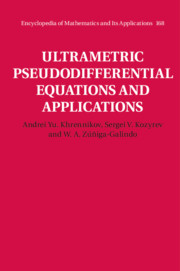Book contents
- Frontmatter
- Dedication
- Contents
- Preface
- 1 p-Adic Analysis: Essential Ideas and Results
- 2 Ultrametric Geometry: Cluster Networks and Buildings
- 3 p-Adic Wavelets
- 4 Ultrametricity in the Theory of Complex Systems
- 5 Some Applications of Wavelets and Integral Operators
- 6 p-Adic and Ultrametric Models in Geophysics
- 7 Recent Development of the Theory of p-Adic Dynamical Systems
- 8 Parabolic-Type Equations, Markov Processes, and Models of Complex Hierarchical Systems
- 9 Stochastic Heat Equation Driven by Gaussian Noise
- 10 Sobolev-Type Spaces and Pseudodifferential Operators
- 11 Non-Archimedean White Noise, Pseudodifferential Stochastic Equations, and Massive Euclidean Fields
- 12 Heat Traces and Spectral Zeta Functions for p-Adic Laplacians
- References
- Index
12 - Heat Traces and Spectral Zeta Functions for p-Adic Laplacians
Published online by Cambridge University Press: 10 May 2018
- Frontmatter
- Dedication
- Contents
- Preface
- 1 p-Adic Analysis: Essential Ideas and Results
- 2 Ultrametric Geometry: Cluster Networks and Buildings
- 3 p-Adic Wavelets
- 4 Ultrametricity in the Theory of Complex Systems
- 5 Some Applications of Wavelets and Integral Operators
- 6 p-Adic and Ultrametric Models in Geophysics
- 7 Recent Development of the Theory of p-Adic Dynamical Systems
- 8 Parabolic-Type Equations, Markov Processes, and Models of Complex Hierarchical Systems
- 9 Stochastic Heat Equation Driven by Gaussian Noise
- 10 Sobolev-Type Spaces and Pseudodifferential Operators
- 11 Non-Archimedean White Noise, Pseudodifferential Stochastic Equations, and Massive Euclidean Fields
- 12 Heat Traces and Spectral Zeta Functions for p-Adic Laplacians
- References
- Index
Summary
Introduction
The connections between the Archimedean heat equations with number theory and geometry are well known and deep. Let us mention here the connection with the Riemann zeta function which leads naturally to trace-type formulae, see e.g. [48] and the references therein, and the connection with the Atiyah–Singer index theorem, see e.g. [178] and the references therein. The study of non-Archimedean counterparts of the above-mentioned matters is quite relevant, especially taking into account that the Connes and Deninger programs to attack the Riemann hypothesis lead naturally to these matters, see e.g. [112], [121], [309] and the references therein. For instance, several types of p-adic trace formula have been studied, see e.g. [13], [96], [449] and the references therein.
In this chapter we study heat traces and spectral zeta functions attached to certain p-adic Laplacians, denoted as Aβ, following [105]. Using an approach inspired by the work of Minakshisundaram and Pleijel, see [340]–[342], we find a formula for the trace of the semigroup e−tAβ acting on the space of square integrable functions supported on the unit ball with average zero, see Theorem 12.13. The trace of e−tAβ is a p-adic oscillatory integral of Laplace–type. We do not know the exact asymptotics of this integral as t tends to infinity; however, we can obtain a good estimation for its behavior at infinity, see Theorem 12.13 (ii). Several unexpected mathematical situations occur in the p-adic setting. For instance, the spectral zeta functions are p-adic Igusa-type integrals, see Theorem 12.18. The p-adic spectral zeta functions studied here may have infinitely many poles on the boundary of their domain of holomorphy. Thus, to the best of our knowledge, the standard Ikehara Tauberian theorems cannot be applied to obtain the asymptotic behavior for the function encompassing the eigenvalues of Aβ less than or equal to T ≥ 0. However, we are still able to find good estimates for this function, see Theorem 12.18, Remark 12.19, and Conjecture 12.20. The proofs require several results on certain “boundary-value problems” attached to p-adic heat equations associated with operators Aβ, see Proposition 12.5, Theorem 12.11, and Proposition 12.12.
- Type
- Chapter
- Information
- Ultrametric Pseudodifferential Equations and Applications , pp. 198 - 213Publisher: Cambridge University PressPrint publication year: 2018



